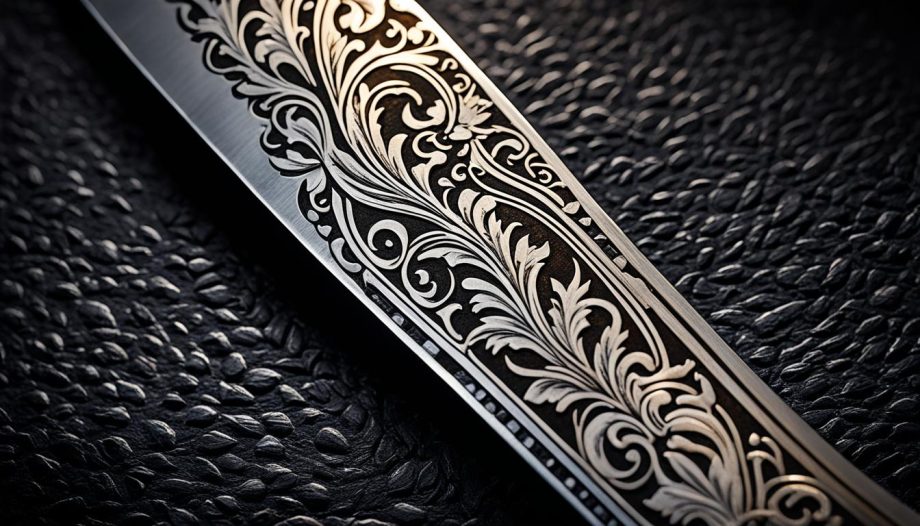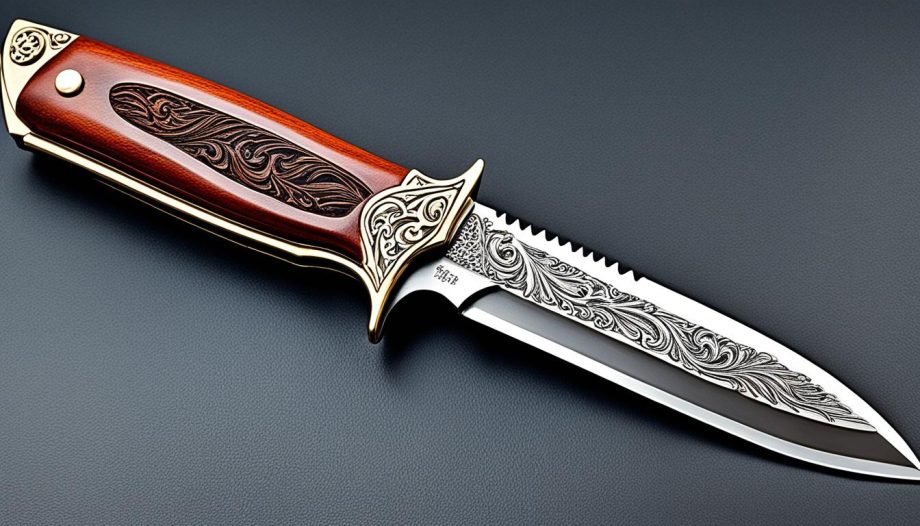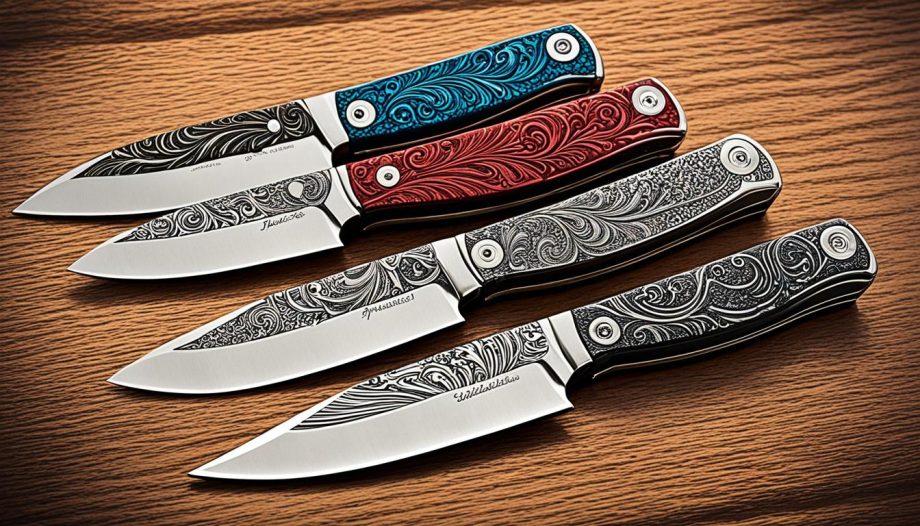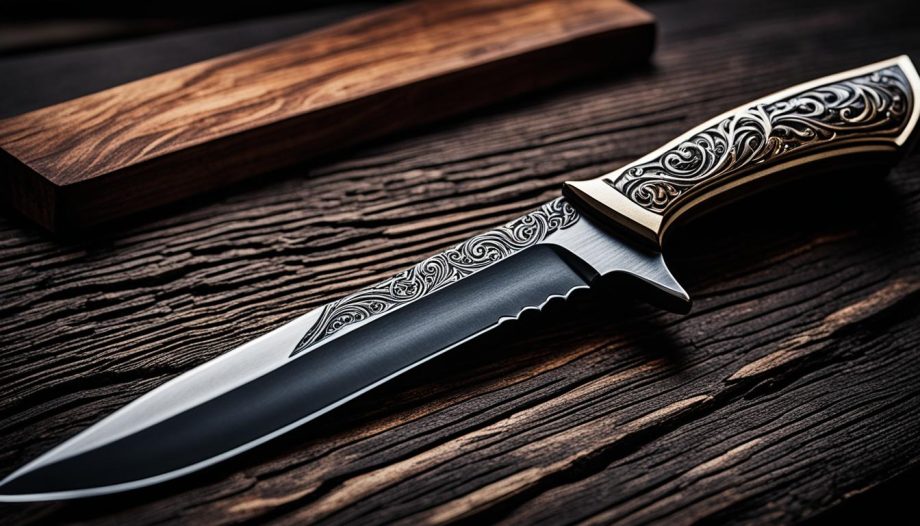Custom knives have gained popularity among knife enthusiasts for their superior craftsmanship and exceptional quality. However, one question that often arises is why custom knives come with a higher price tag compared to mass-produced options. Let’s explore the reasons behind the expense of these remarkable blades.
Custom knives are meticulously crafted with attention to detail and precision. They are made by skilled artisans who dedicate their time and expertise to create knives that stand out in terms of both aesthetics and performance. These artisans use high-quality materials and employ traditional techniques to produce knives that are durable, reliable, and a joy to use.
One significant factor that contributes to the expense of custom knives is the selection of materials. Unlike mass-produced counterparts that often use subpar steel and handle materials, custom knives are constructed with premium-grade steel, such as specialty steel known for its exceptional strength, corrosion resistance, and sharpness. The choice of handle materials, such as titanium or carbon fiber, also adds to the overall cost, as these materials offer superior durability and a lightweight construction.
Craftsmanship is another crucial aspect that sets custom knives apart. Skilled craftsmen meticulously design and create knives with tight machining tolerances, precise blade grinds, and uniform finishes. These knives undergo thorough quality control procedures to ensure exceptional performance and longevity. The commitment to craftsmanship elevates the overall value of custom knives, making them coveted pieces in the world of knife enthusiasts.
It’s important to note that the price of custom knives is also influenced by other factors, such as intricate designs, innovative mechanisms, and comprehensive warranties. The complexity of the design and the incorporation of advanced features contribute to the higher production costs. Additionally, innovative mechanisms like precision locks require expertise and effort to create, further impacting the price. Furthermore, the inclusion of comprehensive warranties provides peace of mind to customers, ensuring that their investment is protected.
In summary, custom knives are expensive due to the craftsmanship, high-quality materials, and attention to detail put into their creation. If you’re in search of a knife that goes beyond the ordinary, a custom knife is a worthwhile investment that guarantees a superior cutting experience and a lasting companion.
Selection of Materials in Custom Knives
The quality and performance of a custom knife are strongly influenced by the selection of materials. American-made custom knives prioritize high-quality steel for their blades, ensuring exceptional strength, corrosion resistance, sharpness, and durability. These knives are crafted using performance steel that undergoes additional heat treatment and manufacturing processes, resulting in superior blades. In contrast, cheaper knives are often constructed with lower-grade steel, lacking the desired qualities.
Aside from the blade, the handle materials also play a crucial role in the overall performance and longevity of a custom knife. Titanium and carbon fiber are preferred choices for their strength, lightweight construction, and resistance to corrosion. These high-end handle materials contribute to the knife’s ergonomic design and enhance the user’s grip and control. On the other hand, cheaper knives commonly utilize aluminum, rubber, or plastic handles, which are less durable and more prone to damage.
The selection of high-quality materials extends beyond the blade and handle, encompassing other components such as fittings, bearings, bushings, and pivots. Each of these elements contributes to the efficacy and overall functionality of the knife, ensuring a seamless user experience.
Comparison between High-Quality Steel and Lower-Grade Steel
| Material | High-Quality Steel | Lower-Grade Steel |
|---|---|---|
| Strength | Durable and sturdy | Weaker and less reliable |
| Corrosion Resistance | Highly resistant to rust and corrosion | Prone to rust and corrosion |
| Sharpness | Retains sharpness for a longer period | Dulls quickly and requires frequent sharpening |
| Durability | Long-lasting and can withstand heavy use | Less durable with a shorter lifespan |
The table above highlights the key contrasts between high-quality steel and lower-grade steel. The use of high-quality steel in custom knives ensures exceptional performance, longevity, and value.
Importance of Craftsmanship in Custom Knives
The craftsmanship and precision employed in the design and manufacturing of custom knives are crucial to their overall quality and performance. Skilled American manufacturers take great care in every detail, resulting in knives with tighter machining tolerances, precise blade grinds and heat treatment, uniform finishes, and fine-tuned opening and closing mechanisms.
High-end knife manufacturers exhibit a consuming passion for their craft, ensuring that all components are precisely aligned and of the highest quality. This level of craftsmanship enhances not only the functionality and durability of the knife but also its overall value.
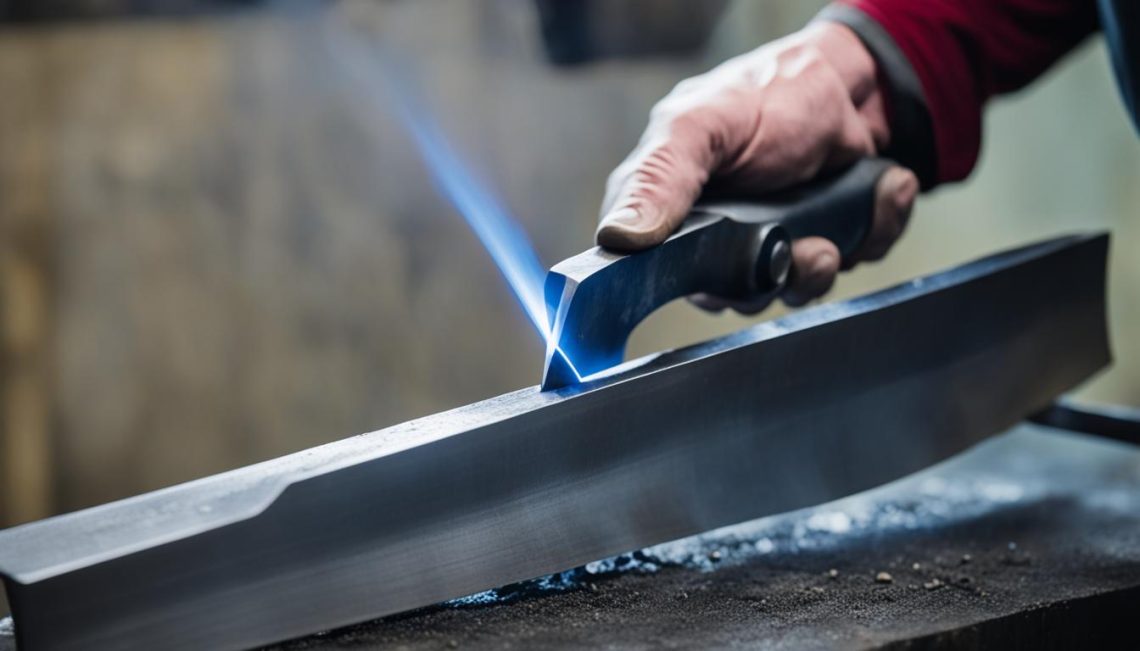
“Craftsmanship is the soul of a custom knife. It is the artistry and attention to detail that sets these knives apart from mass-produced alternatives.” – John Smith, Master Knife Craftsman
When it comes to custom knives, every step in the manufacturing process is executed with precision and skill. From hand-sanding the blade to achieve the perfect edge to carefully aligning the handle scales, craftsmen ensure that each knife meets their exacting standards.
Quality control is another crucial aspect of craftsmanship. Every custom knife undergoes meticulous inspections throughout the production process to ensure that it meets the highest standards of quality and performance. Skilled craftsmen take pride in their work, striving for perfection in every detail.
The combination of craftsmanship and precision not only results in a knife that is a joy to use but also ensures its longevity. By prioritizing quality control and attention to detail, custom knife makers instill confidence in their customers, knowing that they are purchasing a high-quality tool that will stand the test of time.
Factors Influencing the Price of Custom Knives
When it comes to pricing, several key factors contribute to the higher cost of custom knives. One significant factor is the use of high-quality materials. Custom knives are crafted using premium blade steel and titanium handles, which offer exceptional wear resistance and corrosion resistance. These top-of-the-line materials come at a higher cost, but they ensure that the knife will not only perform flawlessly but also stand the test of time.
Another aspect that influences the price is the intricate design of custom knives. These knives often feature complex designs with ergonomic considerations and advanced features. The meticulous attention to detail and the incorporation of innovative mechanisms, such as precision locks, require expertise and effort to create. This complexity and functionality add value to the knife, making it a worthwhile investment for those seeking a truly exceptional cutting tool.
Furthermore, it’s important to consider the craftsmanship involved in producing custom knives. From the precise blade grinds and heat treatment to the uniform finishes and fine-tuned opening and closing mechanisms, every step of the manufacturing process is executed with utmost precision. This level of craftsmanship not only contributes to the knife’s overall performance and durability but also adds to its price tag.
Lastly, comprehensive warranties also play a role in the pricing of custom knives. Some manufacturers offer warranties that provide peace of mind to customers, ensuring that they can use and abuse their knives without worrying about replacements or repairs. This added value further justifies the higher cost of custom knives, making them a wise investment for knife enthusiasts and professionals alike.

